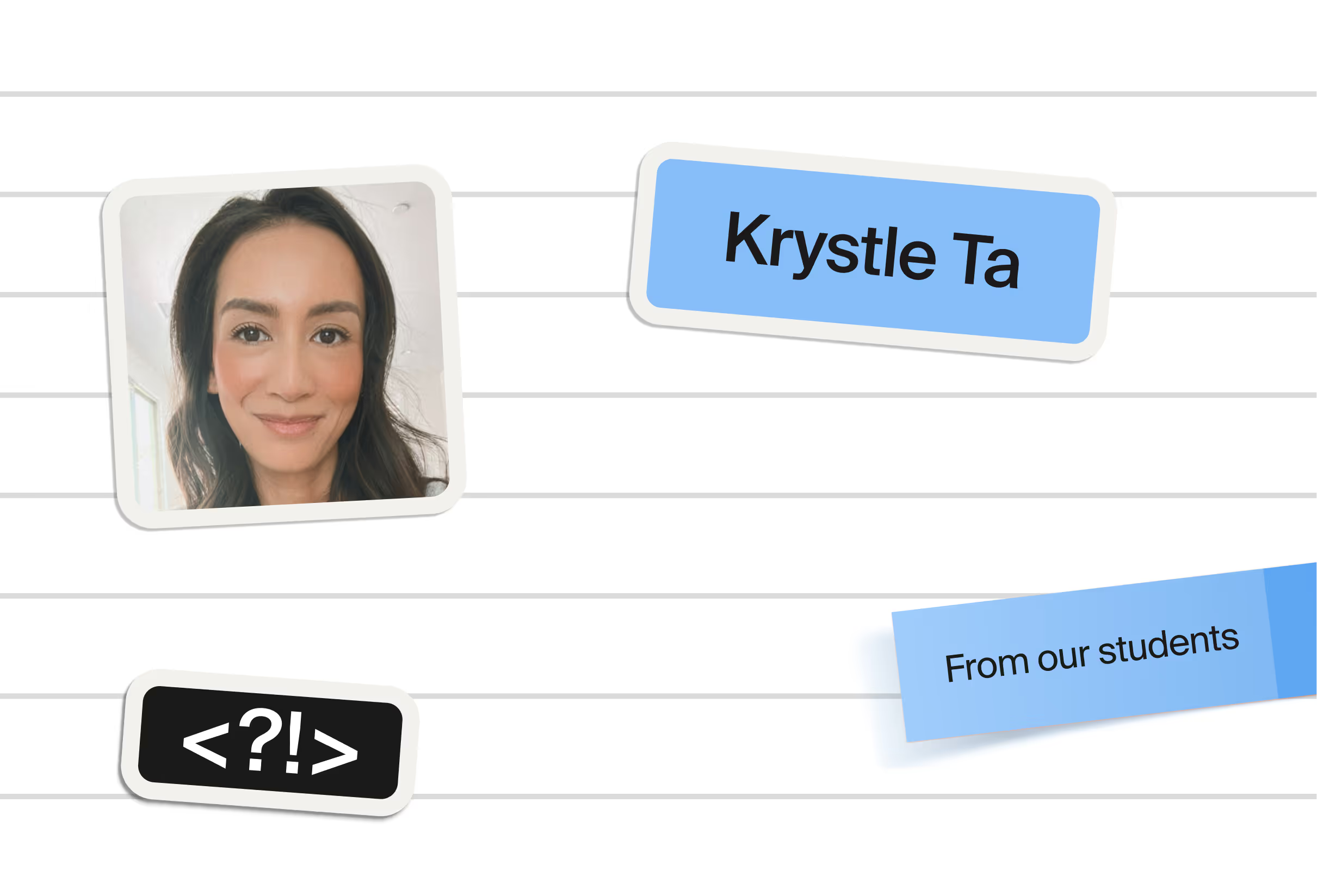When you come across a tech job that lists a bunch of foreign-looking requirements, what’s your reaction? We wouldn’t be surprised to hear you say, “I immediately leave the page, because there’s no way I’m landing that role.”
What if we told you it’s entirely possible to get tech jobs with no experience? No, seriously, we know it can be done because we’ve seen it happen time and again. So here’s how to start a tech career with no experience from people who’ve powered these changes.
Before we get into the meat of it all, let us just say that when wondering how to start a career in tech with no experience, it’s common to face doubt and fear.
As a mid-level professional, you might worry you’re too late to change careers. (You’re not.) Without a college degree, you might hesitate to apply to your dream company. (You shouldn’t.) Trying to balance parenting and work, you might have concerns about finding a job you love that also has flexible or remote options. (You will.)
Imposter syndrome is real and valid. But it’s easily cured by changing your perspective.
For example, you might be uncertain you can land an entry-level tech job without previous experience. We encourage you to instead consider that rather than a hindrance, your lack of experience is an asset.
Don’t believe us? Let us explain.
Why tech employers want people like you
Tech employers hire professionals from unique and seemingly irrelevant backgrounds all the time for a variety of reasons, which we’ll outline below.
But before we jump in, you might be wondering: What about a lack of a college education, in addition to having no experience? Well, tech companies are increasingly letting that slide, too.
In 2025, 7 in 10 hiring managers said their company prioritizes experience over degrees, and Apple’s CEO Tim Cook even said he doesn’t consider a college degree an indicator of success when vetting candidates.
If that’s not reassuring enough, consider this quote from Michael Bush, CEO of Great Place to Work: “What helps is whether or not people have perseverance and passion and the actual skills required to bring innovative solutions to the work and AI is being used now to match people to challenges and complex problems and companies. They’re going to do that using the skills database, not degrees. Degrees are irrelevant in that analysis.”
Feeling better? Now, let’s explore how having no tech experience, whether in school or outside of it, can be of value to employers.
1. You bring a fresh perspective
Software engineers, data analysts, product managers, and IT specialists spend months, if not years, building and refining their products. They're in the weeds, ensuring code gets delivered on time and without bugs. They’re considering the needs of their customers, yes, but also the needs of their immediate managers, higher-ups, and other stakeholders.
This is all to say that in the constant shuffle of day-to-day work, the bigger picture can easily get lost.
New hires, among other things, help companies realign and reflect. They’re eager to make changes or suggestions because they’re less attached to the “old ways,” and they bring in new ideas as a result of their experience at other companies or working with other products.
A sales representative or HR manager can comment on the usability and convenience of a CRM or hiring tool. A retail worker knows what makes for a seamless checkout experience, both on the consumer end and the employee’s. Anyone in any field can provide feedback on their favorite app or piece of hardware, or on a workflow that’s just not productive.
By being partially, if not completely, removed from the technical aspects of a product or service, you provide a valuable perspective that allows tech teams to work smarter and more effectively toward their goals. Wondering how to get an entry-level tech job? Your outsider status can be your secret power.
2. You already have most (or all) of the relevant soft skills
Tech roles and tech companies prioritize soft skills as much as hard skills, mainly because the work is highly collaborative. So when talking about how to get a job in tech with no experience, it’s a bit misleading because you actually do have experience — just not in the industry itself.
You can be the best coder in the world, but if you’re terrible at managing your time, your code will never ship. You can excel at pulling data, but if you can’t think critically, you’ll never actually gather useful insights from that data. You get the idea.
Taxi drivers become adaptable and good problem solvers when faced with road delays or changing passenger demands, skills that come in handy when code breaks or an app isn’t driving users (see what we did there?). Bartenders are meticulous with details and highly creative, which allows them to make delicious drinks or deliver unique software features. Office clerks are strong multitaskers and stakeholder managers — key attributes for project and product managers.
Tech soft skills can also be taught and harnessed outside the workplace. For example, liberal arts majors are great at communicating and incredibly curious, qualities that make for some of the best data scientists. Want to know how to get started? Reflect on the soft skills you’ve gained. They might just be your leg up.
3. You’re motivated and open-minded
By considering a career in tech, you’ve already shown employers you’re ready and excited to learn. That’s a skill that can’t be taught, and one that many qualified tech workers lack.
Some employers may take candidate one — at the end of the day, they may just have work they need done and done well, without much training. But many other organizations will love candidate two so much that they’ll overlook what’s missing in favor of someone they can mold, nurture, and retain long term. So one way to crack the nut of how to get a tech job with no experience is to out-prepare and outshine other jaded candidates.
How to start a career in tech with no experience
1. Reframe the skills you do have to help you land a job in tech
A common misconception is that you have to start from scratch if you’re changing careers into tech. Certainly, you may have to explore entry-level tech jobs before moving into a higher level or management track. But being considered for those roles doesn’t mean you have to scrap everything you’ve built up until this point. You may even need less training than you think.
All you have to do is draw parallels between your skill set and the responsibilities of say, a software engineer or quality assurance engineer. Easier said than done, sure, but nowhere near impossible. Here’s how:
Evaluate the hard skills you have that are directly or indirectly tied to tech.
What software do you know, even at a beginner level? Have you worked with data? Conducted research or user testing? Teachers, for example, test out new ways of educating students constantly. Marketers are familiar with CRM tools, creating pipelines, and analyzing market trends.
Gather up all your strongest soft skills and the stories they tell.
Have you overseen or managed people, stakeholders, relationships, or systems? Have you been involved in problem-solving or coming up with new and creative ways to tackle issues? Are you great at divvying up your time and priorities? Again, there are probably a lot of examples that may seem random but are highly relevant to working in tech. Nurses juggle many different patients and cases at a time. Baristas and customer service representatives have fantastic interpersonal skills.
We’re not saying you can coast into a tech career on transferable skills alone. However, software development is about more than just knowing programming languages.
Tech companies value and often seek out candidates who show how their diverse and unique perspectives can lead to better innovations, smoother processes, and higher employee engagement.
In other words, getting a tech job with no experience is all about how you market yourself and craft your application. So prepare these talking points and your confidence in them ahead of time, and you’ll nail behavioral interviews, networking conversations, and other key steps in your job search.
2. Get more training
Software developers code. Data analysts build systems to parse through data. Support technicians resolve bugs. This is a simplified take of each field, of course, but the point is: Each role requires specific technical expertise that can’t just be pulled from thin air.
So to answer your unspoken question, yes, you’ll probably need to get some training if you have no experience in tech. But how you get that training can vary!
Everyone learns differently and at different paces. Luckily, our modern world provides options to accommodate for this.
Many established universities and institutions (think: Big Tech) offer certification courses and graduate programs in computer science that mimic the feel and benefits of a classroom, such as group work, quizzes, and live instruction. But if hands-on learning and building a portfolio are a priority for you, and you can’t afford the steep costs of higher education, consider a bootcamp.
Many, like TripleTen, are targeted at beginners who want to study on the side while maintaining a full-time job or caregiving. In addition, they partner with reputable companies to offer externships and project-based work that allow students to put their skills to the test. For more insight, here’s how to use review platforms to vet which bootcamps are legit.
Finally, internships or returnships (internships targeted at mid-level professionals) are great opportunities to be trained under experts in the field while still making some salary.
3. Take your education into your own hands
Maybe paying for an online bootcamp or graduate degree isn’t in the cards for you right now, or you want to do more research before committing. There are tons of ways to teach yourself about skills such as coding, data analytics, or information technology at little to no cost. Some ideas:
- Reading books such as these or these.
- Listening to podcasts like the ones on this list.
- Subscribing to newsletters, blogs, tech influencers, or other resources.
- Raising your hand to get involved in software development or tech projects at your current company.
- Freelancing or consulting for a tech company or startup.
- Creating a website, app, or business in basic languages such as HTML or CSS.
- Watching videos on YouTube.
- Contributing to an open source project on GitHub.
Note, however, that only a select few are successful in this route. The completion rate for free online courses ranges between 5% and 15%, we’ve previously reported, and it’s not the best choice if you lack self-motivation and the time and resources to study independently.
4. Pursue jobs that are tech-adjacent
You know the old saying of getting your foot in the door? Well, in tech, it can be incredibly effective to pursue jobs that are adjacent to what you want to do long term just to build a reputation and get the attention of the right people.
For example, maybe you want to become a web developer, but you currently work for a nonprofit. Your first step might be to apply to jobs at a tech company building software for nonprofits.
Next, you land a role as a sales representative at said company thanks to your experience partnering with sponsors and rubbing elbows with donors. Sure, you’re not building websites, but you are getting a closer look into the process, as well as a better understanding of your customers’ needs. Over time, you become an expert on the product and how to sell it.
Maybe you begin pitching your manager the benefits of getting more involved in software development. Or maybe you’ve built a great relationship with an engineer who’s happy to include you in meetings when you mention your interest. When you’re successfully contributing to a project or two, maybe discussions of internally transferring happen naturally, or you find yourself getting poached by product leaders.
As you can tell, none of this happens overnight. But there are so many benefits to this approach: You don’t have to leave your job or a steady paycheck to make moves, and you can learn as you go in a supportive, familiar, and hands-on environment.
The benefits for companies to invest in employees like you is clear, too: They get to retain great talent, diversify their teams, and save costs on hiring.
5. Network to get an entry level tech job
We all know the value of a referral: When hiring managers have to sift through hundreds of resumes, a name-drop can go a long way in putting your application at the top of the pile.
But leveraging and growing your network shouldn’t only be about getting a recommendation. After all, that can feel slimy and quickly turn off professionals in your field. More importantly, with this tactic, you’re missing out on so many other tools at your disposal.
A connection in the tech industry can help you figure out what you want to do by answering your questions or walking you through their journey. They can mentor or tutor you in crucial skills. They can prepare you for job interviews or tricky situations that may pop up as you explore beginner tech jobs. They can alert you to openings that their network is promoting.
So how can you build a network in an industry you’ve never entered before? Start with the network you have. Ask colleagues, friends, and family members if they’d be open to connecting you to people they know in tech. Find connections of connections through LinkedIn. Network within your company with individuals who work or have worked in tech roles. Always begin the conversation by coming prepared with tailored questions and the expectation that you’re interested in their perspective and advice — not a referral. Who knows, if you make a good impression, they might recommend you all on their own!
Top entry-level tech jobs that don’t require experience
If you’ve already taken one or more of the steps above, here are the best entry level tech jobs to consider (data sourced from Glassdoor and the United States Bureau of Labor Statistics):
The additional skills you’ll need to break into tech
Now, just because we say you can get a tech job with zero experience doesn’t mean you don’t need any sort of training whatsoever. You can’t build a website on courage and organization alone. And even candidate two in the example above had worked as an intern before applying.
What we are saying is that you can break into tech without taking the traditional path — namely, college or graduate school. (Note, too, that even the best educational institutions struggle to give students the proper technical training for today’s workforce). Bootcamps such as TripleTen’s online programs are one route to take. Others include taking a certification course, participating in a hackathon, or contributing to open-source projects.
All of these options can bridge the gap between your current skill set and the skill set needed to become, say, a software engineer or business intelligence analyst. These (mostly hard) skills might include:
- Programming languages such as Python, JavaScript, SQL, or R
- Data preparation, analysis, management, and visualization
- Project management tools such as Jira or YouTrack
- APIs
- Artificial intelligence and machine learning
- Statistics and probability theory
- Problem solving and critical thinking
- Presentation and communication
- Time management and attention to detail
People who’ve made the switch to tech
If you’re curious to know exactly what pivoting from an entirely different field into an entry-level tech job looks like, check out these two success stories from TripleTen graduates:
Tiffany Hall came from teaching
Tiffany Hall, a special ed teacher of 15 years, was inspired by her experience with education technology to pursue a career in software engineering. “I believe so much in technology and embracing it. I realized I gotta get out and make sure that educational tech gets more opportunity in front of teachers and students,” she said.
After attending TripleTen’s bootcamp, she landed a role at a company developing an algorithm to determine what instruction a student needs and for how long. “I wanted this job so bad. As an educator, it’s like working for Google or Disney. It’s just that level,” she said.
Jake McCambley moved from wilderness therapy
Jake McCambley started his professional journey in wilderness therapy, which had him taking groups on week-long camping trips to the desert. But he had always been interested in coding — and TripleTen’s was an appealing opportunity.
One of my favorite things about the education — and one of the things that most helped me become the engineer I am today — were the project-based sprints. Jake McCambley, TripleTen grad
“By the end of the week, you have a full project that you can then show off in your portfolio,” he said.
He now works at Zencare, a therapy platform that allows him to assist even more people with finding the help they need.
TripleTen can help you land a tech job
Tech isn’t for everyone, but just about anyone can get an entry-level tech job.
TripleTen aims to make tech accessible for all, no matter how little experience you have to go off of. Its beginner-friendly bootcamps cover all the basics of popular and lucrative tech jobs, with externships that allow students to put their skills to practice in real-world scenarios and present their results to real company partners for feedback.
Not sure if a tech career is right for you? Take our short quiz to find out.
FAQ
Can I really get a tech job starting from scratch in 2026?
You can absolutely get a tech job if you start from scratch in 2026. Your best bet is to go with a bootcamp that gives you the skills employers are looking for and gives you the career skills you need to ace the interviewing process. You can also teach yourself tech, but expect this to take longer and be less a sure thing.
How long until I can expect a job offer?
As someone new to tech who has just completed a tech bootcamp, expect a job offer within 10 months of graduation. Most people start getting interviews somewhere between three weeks and two months after they really start applying. The key is staying consistent; the work doesn't have to be intense, just regular.
Should I enroll in a bootcamp, get certifications, or just teach myself?
If you’re committed to landing a job, you should enroll in a bootcamp. Certifications alone aren’t going to cut it with employers. They’re looking for practical, proven know-how, and a bootcamp will provide that in the form of in-hand projects when you graduate. Teaching yourself can’t get you that experience, either, but it comes with the additional downside of lacking expert guidance and instruction on the skills companies are actually hiring for.
Which jobs are actually attainable with zero experience?
The jobs attainable with zero industry experience are typically entry-level. For example, help desk roles are the easiest to land. For them, hiring managers care more about whether you can communicate and solve problems than whether you can code. After that, you've got junior web developer roles, junior data analyst positions, and QA testing.
What can I actually expect to make in my first year?
In your first year, what you can expect to make depends on your position, company, and location. Junior software engineer positions range from $101,000 to $170,000. Junior data analysts make $67,000 to $120,000. QA testers see $51,000 to $93,000. TripleTen grads have a median salary of $70,000 post-graduation. Check Glassdoor before you accept anything—salaries vary significantly by city and company size.
.avif)

.avif)









.avif)

.avif)




%20(1).jpg)



%20(1).avif)

-p-800.avif)



%20(2).avif)




.avif)


.avif)



